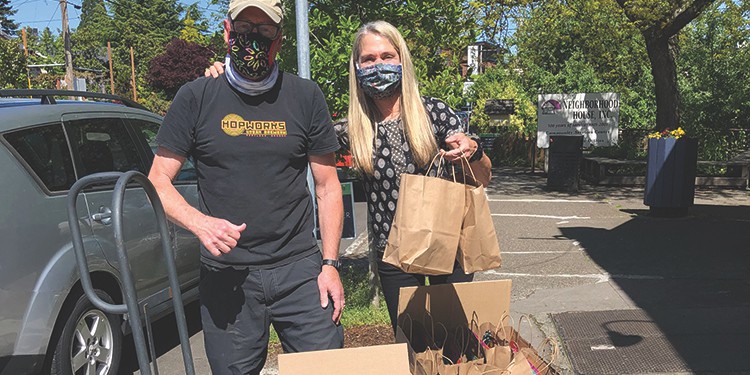
Global pandemic. Economic collapse. Mass protests against another police killing of an unarmed Black man. It’s been the most uncertain few months in our lifetimes — and definitely our kids’ lifetimes. But even in the midst of so much turmoil, many people have stepped up to help others. From donating toys to kids in need to preparing a hospital for an influx of sick patients, some extraordinary people in our community have made this a moment to give back.
Toys for All
If we didn’t already love our local independently owned toy shops before COVID-19, we have all the more reason to love them now. While they had to completely shift their business models, they also came up with ways to give back to our community, knowing that not every family had the money to buy new toys to keep kids busy during shelter in place. Sellwood’s Oodles 4 Kids asked patrons to purchase and donate toys for kids at Raphael House domestic violence shelter. Piccolo Mondo Toys did something similar, with bags of activity toys, games and stickers going to families at Title 1 schools in Beaverton and Hillsboro. And when toy companies Djeco and Peaceable Kingdom heard about the distribution of donations, they donated product as well! And Piccolo Mondo’s actions inspired Thinker Toys to partner with Meals on Wheels to get donated 300-piece puzzles to homebound seniors and also let shoppers buy activity bags for families connected to Neighborhood House Head Start. “Both of us have been drivers for [Meals on Wheels] and recognize that even in normal times, many of these people are not only food insecure, but also socially isolated,” says Joan Steinbach, who is the owner of Thinker Toys along with her husband, Tye. “So this seemed like a perfect way for us to leverage our access to puzzles — an absolutely hot category right now — to add a little stimulation to their lives.” And if that weren’t enough, the Steinbachs even donated an extra puzzle or activity bag for every 10 donated by customers.
Put a Mask on It
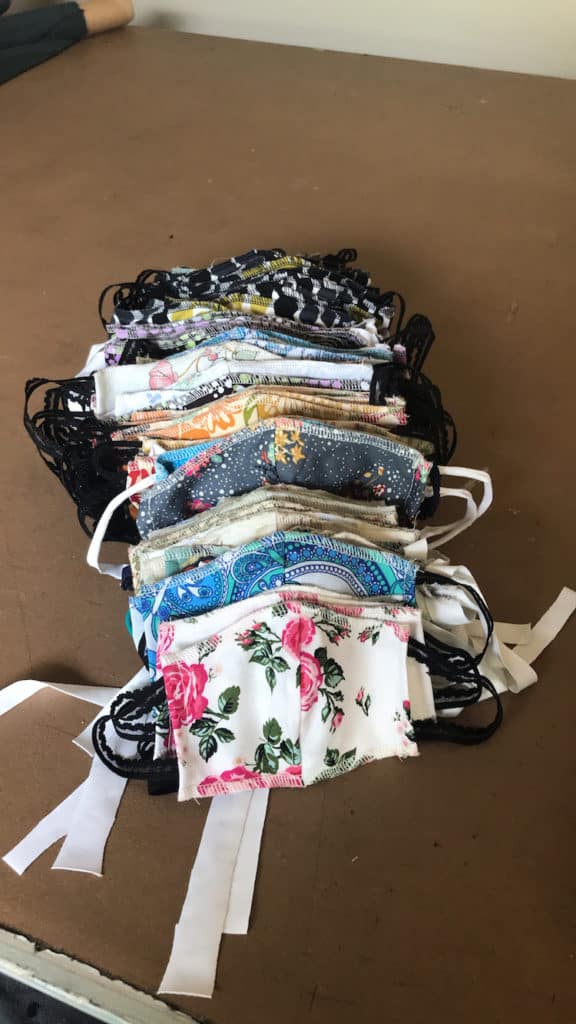
When COVID closures started rolling out, local mom Karina Potestio couldn’t sell her hip warmers, velvet jumpsuits or bird-appliqué-adorned skirts at Portland Saturday Market or any of the other local craft fairs that connect her to customers. But she didn’t stop sewing. She just switched focus. “I saw the need for masks; I had all materials needed to make them in my studio and just started making them,” she says. With a few other volunteers, Potestio has put her electric cutter, industrial sewing machines, serger and straight-stitch machine to work, donating 5,500 fabric masks to health care workers and nonprofits so far. (She’s also selling some masks and her clothing line at etsy.com/shop/karinapotestio.) Potestio and her crew aren’t the only ones to start sewing for the cause. The Facebook group Crafters Against COVID-19 *PDX* rallied more than 8,000 stitchers to make face masks to donate, at first to hospitals and then eventually to Multnomah County for distribution to organizations such as Sisters of the Road, Impact NW and Hollywood Senior Center.
Doctor on the Front Line
If you made a big noise at 7 pm for health care workers during lockdown, then Dawn Nolt, M.D., M.P.H. was one of those people you were cheering for. As an associate professor of pediatric infectious diseases at Oregon Health & Science University (OHSU), she was part of the team that started preparing the hospital for the impact of COVID-19 in late February. “My specific role at the hospital is to always look out for the needs of children during this pandemic,” says Nolt.
What a typical work day at OHSU looks like for her has shifted over the course of the pandemic. “In the beginning, the frenzy and attention around the pandemic was reflected in the work we did at the hospital. Meetings and projects (and emails!) were solely focused on COVID-19,” says Nolt. “As the pandemic seems to have slowed down, the COVID-19 effort has shifted to a maintenance phase. We still have our attention on COVID-19, but now are able to pick up on other projects and issues.” [Editor’s note: We interviewed Dr. Nolt prior to the surge in cases in Oregon.]
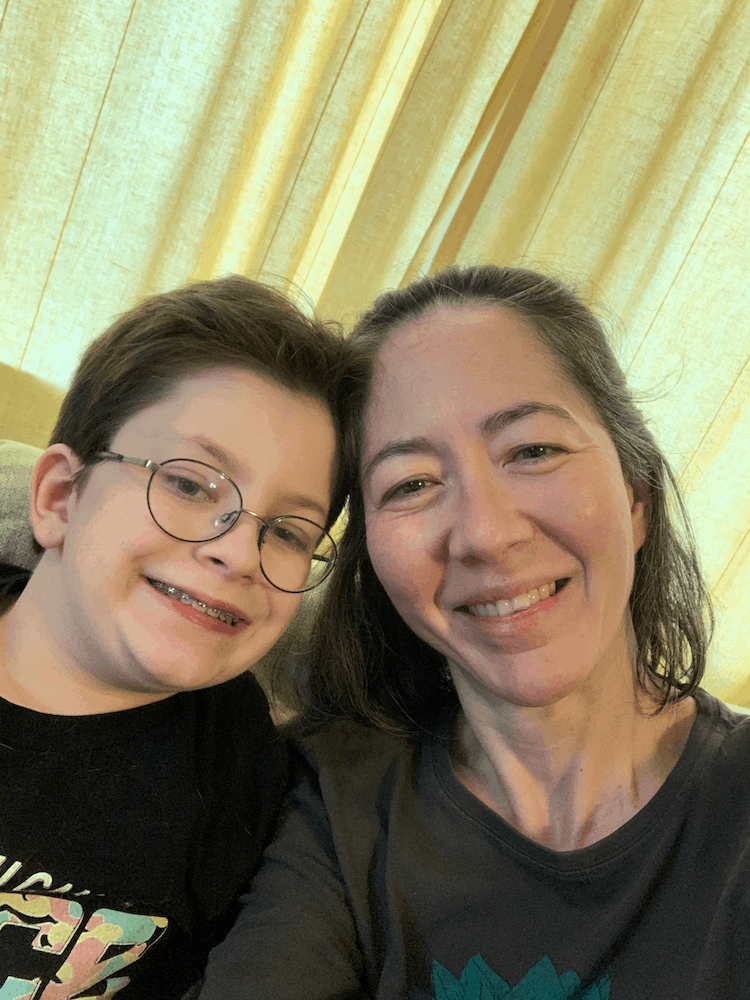
And the anxiety all of us have felt around this crisis? Nolt, mother to 12-year-old Mae, has felt it, too. “The biggest challenge has been to make sure that my mental and physical health, and that of my family, is stable and strong. It’s hard to leave work at work, but I have been getting better at being ‘in the moment’ when I’m with my family,” says Nolt. “I have truly realized that self-care (including drinking more water than caffeine, doing exercise every day that makes me sweat and need to take a shower, and having some hours of uninterrupted sleep) is important to keep going.”
Kindness of Strangers
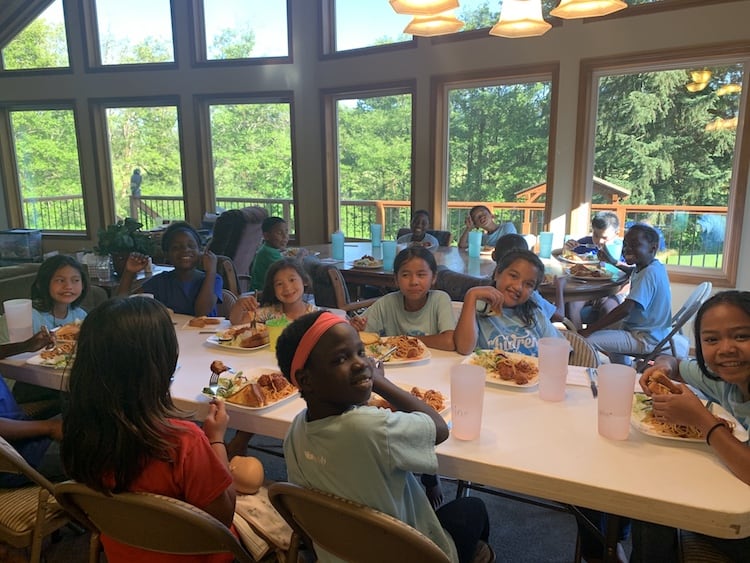
As the world started to realize the severity of COVID-19, many countries closed their borders. And this presented a huge problem for the members of The Children of the World International Children’s Choir. The choir members from Nepal, the Philippines and Uganda, and their chaperones, were on a tour to raise funds for World Help, a Christian children’s humanitarian aid organization based in Virginia. And suddenly, the group couldn’t go home to their families. The 15 kids, three chaperones and two team leaders were on the West Coast and needed a spot where they could all shelter in place together. A family from Woodland, Washington, about 20 miles north of Vancouver, Washington, with ties to World Help stepped up and offered to house the stranded choir and their companions in an event center on their property. The family wishes to remain anonymous, but they did tell PDX Parent about this act of kindness and how the community of Woodland has rallied around the choir. “The school district added the children to their lunch delivery program, which they had up and running just a few days after the schools were closed. Every weekday they drop off lunch and breakfast for the next morning. Many members of our community have dropped off food items as well as meals and cookies for the team. They have also provided games, puzzles, soccer balls and lots of different activities for the kids.”
And as of press time the choir is still in Woodland, but the kids are holding up well. They’ve been studying, playing and putting on talent shows because they love to perform. “I asked one of the chaperones if she thought the kids were homesick or anxious to go home, and she told me, ‘Not at all. They love it here!’ Many of them are aware that life is even more difficult in their home countries right now. In many of these places, people work for day wages and with quarantine, they have zero income.”
The Educators
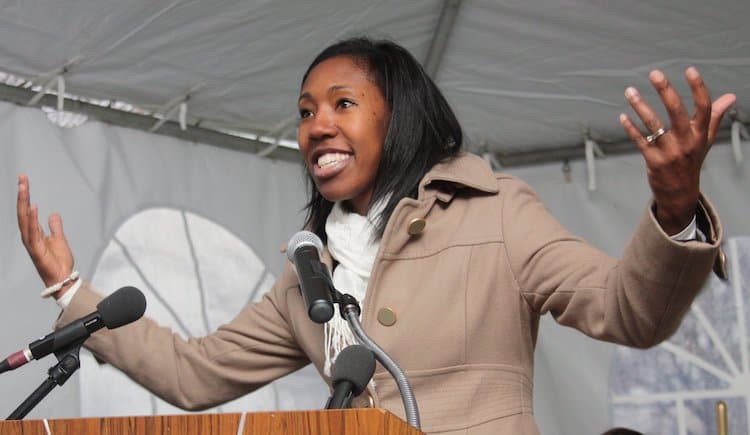
While parents were scrambling to make things work when Oregon schools shifted to distance learning, teachers and administrators were scrambling, too. What works when you are in a classroom doesn’t always translate well to a Google Meet. So we tip our hats to all the teachers and staff who made the best of this huge pivot — all while trying to juggle their own worries over a pandemic and often stuck at home with their kids, too. Some educators stepped up to creatively connect with students. Scott Elementary Principal Megan McCarter became a TikTok star to her students, posting videos of herself dancing. Kali Thorne Ladd, executive director of KairosPDX, a culturally responsive charter school, not only stood out as a leader during the early stages of the pandemic, but when Portlanders were taking to the streets to protest police brutality and the killing of George Floyd, as well. In her We’re in This Together YouTube video, she talked about the impact of trauma on children’s brains and how to reframe the pandemic as a time to build resilience through connection. And on a larger stage with Mayor Ted Wheeler and other community leaders, she delivered an exceptional speech on how our children need us to talk to them about racism because they are our greatest hope for a more just future.
Soothing New-mom Nerves
Giving birth during a pandemic is not for the faint of heart. And caring for a new baby when the world is shut down is undoubtedly nerve-wracking. How are you even supposed to get to all those well-baby appointments? But the mom-and-baby team at Providence St. Vincent developed an ingenious way for parents to bring their newborns in for weight-gain checks: a no-contract newborn checkup. First, parents drive to a building apart from the main hospital, park, and call to let the staff know they’ve arrived for their appointment. Then a health care worker (sometimes nurse Doris Onnis, who has achieved epic status on FB mom groups as a lactation consultant legend) comes out to take the temperatures of the adults. No fever means they can bring their infant inside. The nurses instruct parents how to weigh their babies, and help moms take their own blood pressure. Nurses are still getting eyes on babies and able to answer questions, and new parents are able to get some peace of mind.
Beyond Babysitters
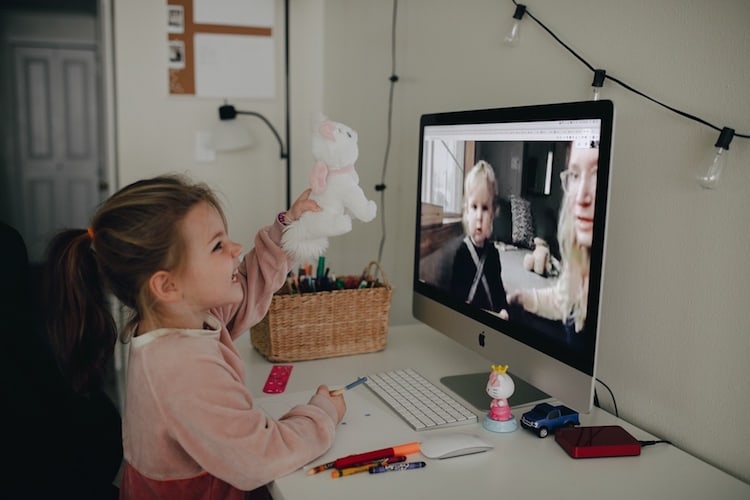
Software engineer Sonya Trachsel knew firsthand the pre-COVID-19 difficulties of finding backup child care for all those common complications that working parents have to deal with: a babysitter canceling at the last minute, a sick child or having to stay late at work. “I thought, What if there was a way to contact everyone you know at once and make a true on-demand solution? Similarly how Lyft does it with commuting,” says Trachsel.
So in the fall of 2019, Trachsel and her business partner, Christopher Eaton, launched Tokka, an app that allows parents to connect to other parents they knew to help each other out with child care. But Trachsel and Eaton realized they needed to broaden circles for helping parents connect, so they planned a relaunch for March 2020. As COVID-19 started spreading through Washington state, Trachsel knew an on-demand babysitting app would not be safe. So they switched tracks. While she was always conscious of how much screen time her now-2-year-old son consumes, she sometimes asked her parents, who live abroad, to connect with her son over video chat to keep him busy. “Him being young they would not last longer than 20 minutes, but sometimes that would be just enough for me to send a couple of critical emails,” says Trachsel. “And that’s when I thought that if [Tokka] can’t provide full-time support for working parents, maybe there is a way for us to help cover short times with virtual support.”
Tokka has gone even further now, to provide not just virtual babysitting, but an enhanced one-on-one experience for kids. Parents will find more than 70 of what Tokka calls “heroes” in Portland, Seattle, San Francisco, Los Angeles and New York. The heroes are performers, artists and other professionals who love entertaining kids. Trachsel says one of the sitters in the Portland area is a botanist who can talk science with older kids or just take younger kids on a tour of her garden, asking them about their favorite colors. (All Tokka sitters must pass background checks.) Prices vary, but an hour costs anywhere from $15 to $40. It’s not a true substitute for in-person child care or school (man, we miss school), but it can mean you get a few precious uninterrupted minutes while your child gets a fun and educational virtual playdate.
Art for This Time
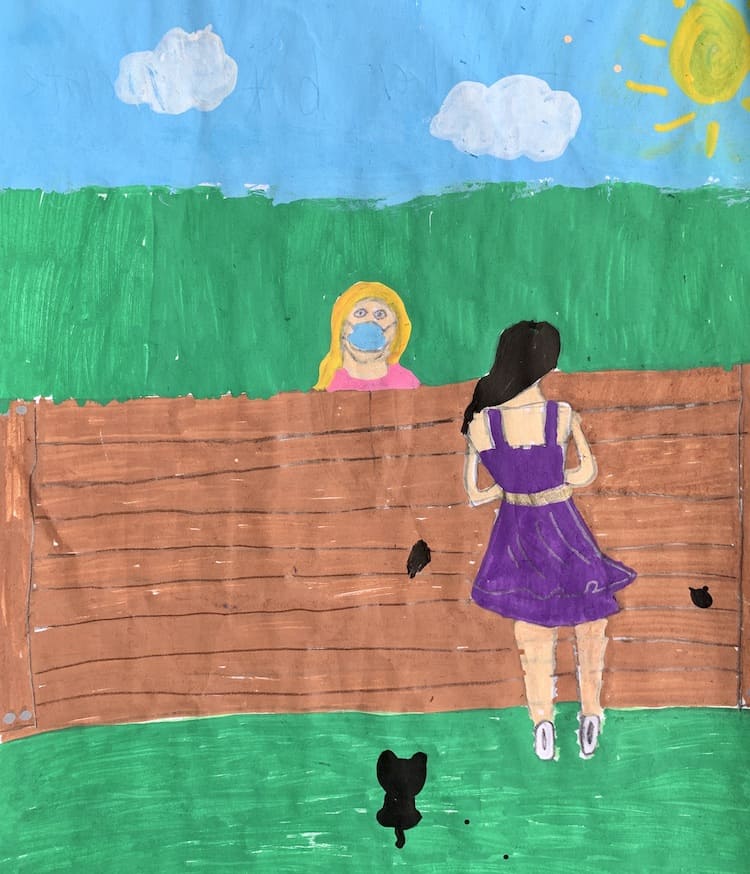
It’s no coincidence that all those art-making videos and kindie musician virtual sing-alongs popped up in your news feeds as Oregon first went into lockdown. Medical studies have shown that creative pursuits such as drawing or making music — even listening to it — can help alleviate anxiety, depression and mood disturbances. The artists instinctively knew what we needed to get through this. The Portland Child Art Studio put a call out to the city’s children to reflect on the time we are living in and create art about it. They gathered submissions in a virtual gallery: portlandchildart.org/gallery-of-art-about-this-time. They plan to continue accepting submissions and giving out free art supplies to kids who drop off art. They’ll also be offering new creative prompts as well. Visit facebook.com/Portland-Child-Art-Studio for more details on when and where to drop off art.
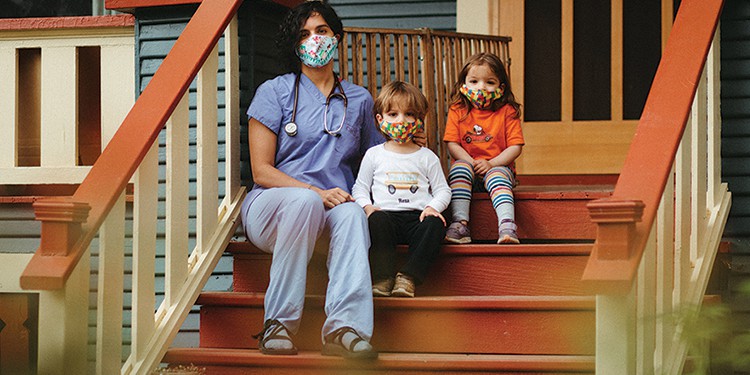
Cover photographer Natalie Gildersleeve started her social distancing family portrait project in Portland, capturing families in this strange moment and inspiring other photographers to get in on the act. “The project really started as a way for me to capture some of the mood I think a lot of us were — and still are — experiencing during this unprecedented time: the isolation, beauty, hope, uncertainty, loneliness — and, most of all, our shared humanity,” says Gildersleeve. “We are all experiencing this in a different way and it felt important to capture that.” And grown-up artists all over the city turned boarded-up shop windows into canvases for murals, spreading beauty along with calls for justice and messages of hope and support.
Feeding Families
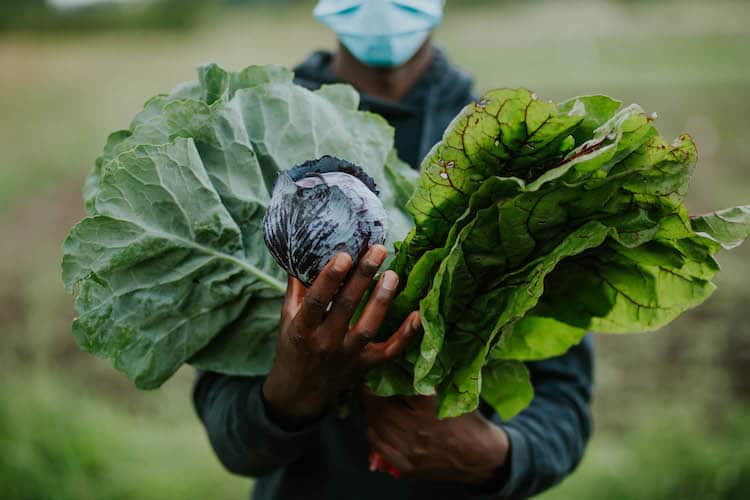
As jobs evaporated in March, many parents were faced with the very real possibility of not having enough food for their families. So restaurants like Laughing Planet stepped up to offer free lunch for kids. Nate Snell of Pip’s Original Doughnuts and Chai turned off the deep fryer and focused on selling jugs of chai tea — and giving 10 percent of the proceeds to restaurant-industry folks out of work. Feed the Mass Executive Director, Jacob Valentine, switched over from offering low-cost cooking classes to providing free meals three days a week from The Redd in Southeast. James Beard-winner Gabriel Rucker of Le Pigeon volunteered with Valentine, bringing his formidable culinary skills to help feed fellow Portlanders. More recently, Equitable Giving Circle dreamed up a way to help both BIPOC farmers and families experiencing food insecurity with their CSA program. Supporters can donate to the program to purchase vegetables and proteins from farmers and food purveyors. And then free food boxes get distributed to BIPOC families who need them. And Grocery Outlet set up a food drive for its shoppers, with donations going to numerous organizations including Blessings in a Backpack, Gladstone Food Bank, Oregon Food Bank and many others. If you need help accessing food resources, please visit Partners for a Hunger-free Oregon at oregonhunger.org.
Books Heal
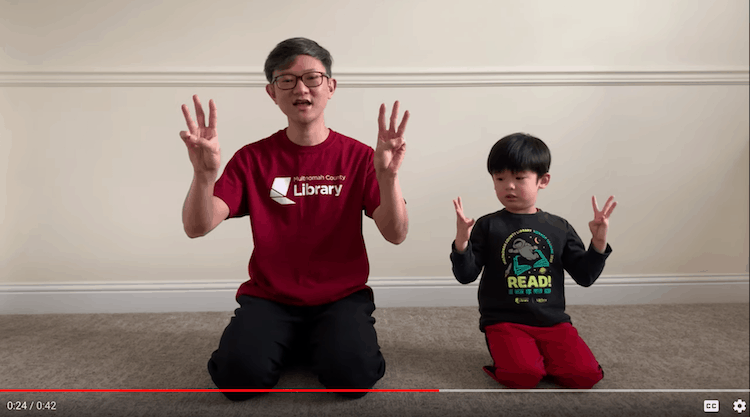
Since libraries shut down in March, librarians have been physically separated from the communities they serve. (As of press time some libraries have started appointment-only curbside pickup.) But it takes more than a global pandemic to keep librarians from spreading their love of literature and doing good for the people who used to come through their building’s doors. Gladstone Public Library has mailed seeds to patrons through its Seeds for Sharing program — and kept families updated on where to find free food giveaways. The Fort Vancouver Regional Library’s experiential learning librarian posted Creation Lab YouTube videos. In one she showed kids how to turn an empty box, black construction paper and a flashlight into a glowing constellation. Washington County Library Services has hosted everything from online shows from The Alphabeticians and Penny’s Puppets to virtual read-alouds of Oregon Battle of the Books titles in English and Spanish. And the mammoth Multnomah County Library system has churned out video after video on YouTube. Our beloved leaders of Book Babies and Tiny Tots read, sang and bounced their way through the favorite songs and books of their tiniest patrons. And they put out their videos for children in numerous languages — Mandarin, Spanish, Russian, Vietnamese and more. And they didn’t forget about the grown-ups. Their social media was awash in author readings and online tutorials on how to do things like make a self-care zine. MCL’s virtual library card program opened up a vast e-book and audio book collection for Portlanders big and small. MCL has even worked to get their Summer Reading game online so your kids could still earn their summer reading T-shirts!
- Where to Get Our Favorite Chopped Sandwich in Portland - March 10, 2024
- 6 New Portland Summer Camps - March 7, 2024
- Get Serious Air at This Indoor Portland Park - February 19, 2024




